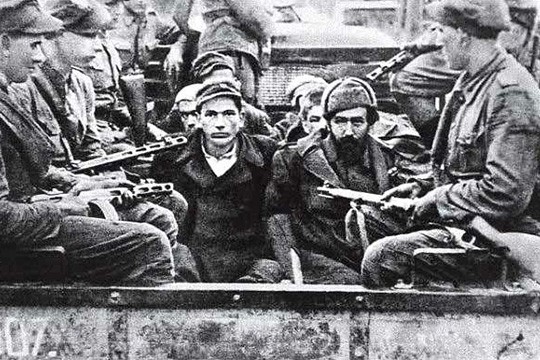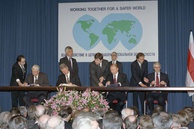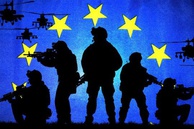Prosecutor’s Office of the Polish Institute of National Remembrance (IPN) has stopped the inquiry into a criminal case on Operation Vistula of 1947, in which thousands of Ukrainians and Lemkos were forcibly resettled from the eastern regions of the Polish People’s Republic to western areas with a view to neutralize the activities of the Ukrainian Insurgent Army and prevent material support of it from the local population.
The verdict of the IPN is that Operation Vistula was preventive, not repressive, and bore no signs of premeditated crime against the Ukrainian minority as such.
For several years Poland has been carrying out a campaign for the re-settlers’ descendants to regain ownership of lost property. Wirtualna Polska has wittingly described it as “the fifth division of Poland”, having published an article under such a title (1). As compensation for lost property, Ukrainians and Lemkos will receive land plots in Carpathian forests.
As a result of Operation Vistula, 260, 000 hectares in Eastern Poland were left without owners. Those forced to resettle in Western Poland were provided with new dwellings which, as the Polish press argues, was often at higher value than the old ones. Nevertheless, as the re-privatization campaign continues, there are fears that the incumbent Minister of Justice Adam Bodnar, a descendant of those resettled, is unlikely to remain impartial on this issue (2).
A number of Polish experts have been criticizing the decision of the IPN demanding that Operation Vistula should be stigmatized as a communist crime on the basis of the resolution of the Polish Senate of 1990 with the condemnation of the policy of the Polish People’s Republic’s authorities in 1947 (3).
As for condemnation/approval of Operation Vistula, several factors come into focus.
Firstly, reference to Ukrainians and Lemkos as different peoples. In the past, Lemkos considered themselves the most western branch of the Russian people (4). Nowadays part of Lemkos consider themselves Ukrainian, while others view themselves as a separate ethnic group, and yet others call themselves Rusyns (in Slovakia). In 2017 the Polish Lemkos Society condemned the cult of Ukrainian Insurgent Army in Ukraine and organized their own remembrance ceremonies on the anniversary of Operation Vistula (5).
This runs counter to the position of Kyiv, which denies Lemos the right to call themselves a separate people. In Poland, as we can see, Lemkos are not deemed as Ukrainians. Warsaw prefers to fragmentaize the Ukrainian national element in Poland into parts, depriving it of unity in identity. The existence of Lemkos as a separate people, provided they demonstrate no Russophile moods and are ideologically opposed to Ukrainian nationalism, is more than welcome in Warsaw.
Secondly, Warsaw found it beneficial to condemn Operation Vistula in 1990, when anti-Soviet sentiments in the society were running high. In subsequent years, Warsaw continued to manipulate the issue as part of overall anti-Communist propaganda. After some time, however, such propaganda lost its original momentum.
At present, criticism of USSR, of the Communist ideology and all things related to it are not as relevant as ten years ago. The portrayal of Operation Vistula as a crime committed by the government of Socialist Poland does not trigger as much public response as before. Warsaw has no interest in cementing this issue into an eternal claim of Ukrainians to the Poles with a view to evoke their eternal confession in front of the re-settlers and their descendants.
Poland is used to being the confessor rather than the confessing, it won’t confess to anyone. The propaganda potential of Operation Vistula is running out, so the authorities are hurrying to close the chapter at the required page. Hence the above- mentioned decision of the Prosecutor’s Office of the IPN.
Thirdly, both those who demand that the re-settlement of Ukrainians and Lemkos should not be seen as a crime, and those who think otherwise, belong to structures financed from the budget. For one, Professor Grzegorz Motyka, though a member of the IPN College, is ardently criticizing the decision of the Prosecutor’s Office (3).
This speaks in favor of the fact that the argument in question is an information show. It is aimed at attracting also Polish patriots, who discern no Polish guilt in the resettlement of Ukrainians and Lemkos, and Polish nationals of Ukrainian descent and representatives of multimillion Ukrainian diaspora, who deem Operation Vistula as a crime, to Poland and its government.
The verdict of the Prosecutor’s Office of the Polish Institute of National Remembrance is yet a new harness thrown by the Polish authorities over the neck of Ukrainian nationalism. What we need to understand is that Warsaw welcomes the survival of Ukrainian nationalism but does not welcome its excessive independence. Hence the decision.
The ambiguous position of the incumbent Polish government on Operation Vistula indirectly meant justification of the anti-Polish policies of the Ukrainian Insurgent Army in the 1940s, when army representatives attacked Polish power officials and civilians.
By adopting such a cunning decision, the IPN has flicked Ukrainian nationalists on the nose. Meanwhile, the authorities, moderating the burning argument from backstage, are set on pushing the Ukrainian nationalism into the limits established by the Polish interests. No matter what resistance it might put up, the Ukrainian nationalism will stay where told. Warsaw has serious plans for “development” of Ukraine.
The opinion of the author may not coincide with the position of the Editorial
- https://wiadomosci.wp.pl/piaty-rozbior-polski-6967954321848832a
- https://myslpolska.info/2023/12/14/syn-przesiedlenca-z-akcji-wisla-ministrem-sprawiedliwosci/
- https://novayapolsha.eu/article/gzhegozh-motyka-prekrashenie-sledstviya-po-delu-operacii-visla-eto-pozor
- https://www.fondsk.ru/news/2017/05/16/lemki-oskolok-zatonuvshej-russkoj-galicii.html
- https://kresy.pl/wydarzenia/lemkowie-obchodzili-w-jaworznie-70-rocznice-akcji-wisla-video/
read more in our Telegram-channel https://t.me/The_International_Affairs

 11:41 11.01.2024 •
11:41 11.01.2024 •



























